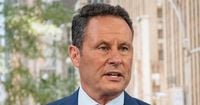On September 10, 2025, Fox News anchor Brian Kilmeade ignited a firestorm of controversy after suggesting on national television that authorities should "just kill" people experiencing homelessness and mental health crises using "involuntary lethal injection." The remark, made during a live broadcast of "Fox & Friends," came as the hosts discussed the recent stabbing death of 23-year-old Iryna Zarutska, a Ukrainian refugee, on a Charlotte, North Carolina light rail train. The accused, Decarlos Brown Jr., a 34-year-old man with schizophrenia and a lengthy criminal record, had been released from a mental health facility just weeks prior to the attack, according to ABC News.
The exchange began when co-host Lawrence Jones argued that mentally ill homeless individuals who refuse help should be institutionalized or jailed. "You either take the resources we give you, or you decide that you’re going to be locked up in jail," Jones said. Kilmeade then interjected with the now-infamous comment: “Or involuntary lethal injection, or something, just kill them.”
The reaction was swift and fierce. Clips of the segment rapidly circulated on social media, drawing widespread condemnation from advocacy groups, political figures, and everyday viewers alike. Critics described Kilmeade’s words as not only insensitive but also reminiscent of eugenicist rhetoric, with some calling for his immediate resignation. According to Truthout, the comment was viewed as “disturbing and eugenicist” by many online, with some observers noting that individuals in other industries have lost their jobs for far less inflammatory remarks.
Homelessness in the United States has reached record highs in 2025, with an estimated 770,000 people experiencing homelessness nationwide. The crisis has been exacerbated by rising housing costs, reductions in the social safety net, and the increasing role of Wall Street firms in the housing market. The vulnerability of those living without stable housing—many of whom struggle with untreated mental illness—has become a flashpoint for national debate, especially in the wake of violent incidents like the Charlotte stabbing.
Adding further complexity to the story, Kilmeade has a history of controversial statements regarding the homeless. In 2023, he publicly praised Daniel Penny as a “hero” for killing Jordan Neely, a Black unhoused man, on a New York City subway. This pattern of commentary has fueled accusations that Kilmeade’s most recent remarks are part of a broader, more troubling outlook toward the nation’s most marginalized populations.
After four days of mounting backlash, Kilmeade addressed the controversy on-air during the September 14 broadcast of “Fox & Friends Weekend.” In his apology, he stated, “We were discussing the murder of Iryna Zarutska and how to stop these kinds of attacks by homeless, mentally ill assailants, including institutionalizing or jailing such people so they cannot attack again. During that discussion, I wrongly said they should get lethal injections. I apologize for that extremely callous remark.” He continued, “I’m obviously aware that not all mentally ill homeless people act as the perpetrator did in North Carolina, and that so many homeless people deserve our empathy and our compassion.”
Despite the apology, many critics remain unsatisfied. As reported by The Express, a petition demanding Kilmeade’s firing was launched on Change.org and had garnered 330 signatures by September 16. The petition asserts that Kilmeade’s remarks “promote violence against some of the most vulnerable members of our society—people experiencing homelessness and serious mental illness,” further arguing that his words “dehumanize them, reduce their lives to disposable inconveniences, and implicitly endorse state-sanctioned violence.” The petition also calls for Fox News to issue a public apology, implement mandatory training on stigma and mental health for all on-air talent, and for sponsors to withdraw advertising until these actions are taken.
Advocacy groups and mental health professionals warn that such rhetoric can have real-world consequences. The suggestion of executing people struggling with mental illness and homelessness, even if later retracted, can deepen stigma and potentially incite violence against already marginalized communities. As one critic wrote in Truthout, “It isn’t merely mean-spirited to call for the murder of mentally ill people for declining treatment; it's a bid to have the state violate basic human rights.” The same piece pointed out that Kilmeade’s apology was qualified—he specified that “not all” mentally ill homeless people act violently and that “many” deserve compassion—leaving some to question whether he truly repudiated his original stance.
The Charlotte stabbing itself remains a tragic example of the intersection between systemic failures in mental health care and public safety. According to ABC News, Brown’s family had struggled to secure appropriate treatment for him. His mother, Michelle Dewitt, recounted that she had to seek a court order to have her son admitted to a mental hospital, only to see him released after just 14 days. She later dropped him off at a homeless shelter, still deeply concerned for his well-being and the safety of others. Brown had 14 prior criminal cases and had been diagnosed with schizophrenia, underscoring the challenges families face in navigating a fragmented mental health system.
Within the “Fox & Friends” segment, co-host Ainsley Earhardt appeared to take Kilmeade’s proposal seriously, asking, “Yeah, Brian, why did it have to get to this point?” Kilmeade replied, “I will say this, we’re not voting for the right people.” The lack of immediate pushback from his colleagues was noted by commentators as evidence of how normalized harsh rhetoric toward the homeless and mentally ill has become in certain media circles.
Political figures and commentators from across the spectrum weighed in. California Governor Gavin Newsom, among others, condemned Kilmeade’s remarks, while others argued that the controversy reflects deeper societal divides over how to address homelessness and mental illness. Some right-leaning voices echoed the need for stricter policies, while progressives decried the dehumanization of society’s most vulnerable.
As the debate rages on, the underlying issues remain unresolved. The United States continues to grapple with a mental health crisis, a lack of affordable housing, and a political climate that often prioritizes punitive solutions over compassionate care. The Charlotte tragedy, and the media firestorm that followed, have reignited urgent questions about how best to protect both public safety and the dignity of those most at risk.
While Brian Kilmeade’s apology may have quelled some of the immediate outrage, calls for accountability and systemic change persist. The episode serves as a stark reminder of the power—and responsibility—of public figures to shape national conversations, for better or for worse.


